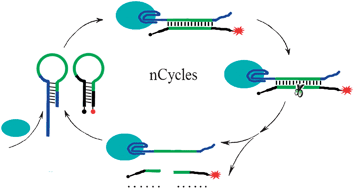
Huang-Hao Yang and colleagues at Fuzhou University used single-stranded nucleic acids known as aptamers to detect thrombin, an important protein involved in blood clotting.
Although other aptasensors are known, they are more complex than this new sensor, says Yang. And the sensitivity here is three orders of magnitude higher than traditional homogeneous aptasensors.
The improvement is thanks to a nicking enzyme, which Yang used instead of the more usual polymerase. A nicking enzyme recognises a specific sequence in double-stranded DNA. It then cleaves only one strand, leaving a nick in the DNA.
The aptasensor is capable of detecting thrombin in real samples and could be expanded to other proteins simply by changing the aptamer sequence.
To find out more about how it works, download Yang’s ChemComm communication.










